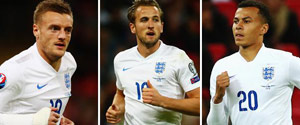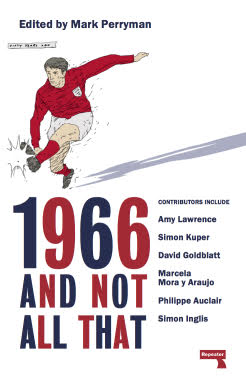
An Imagined Community of Eleven Named People
15.05.16
Mark Perryman explores what Monday’s announcement of the England Euro 2016 squad tells us about modern Englishness
 The backpages will be full of hopeful optimism after the announcement of England’s provisional squad for Euro 2016. A squad full to bursting point with youthful promise it is the England fan’s lot to believe for 50 years it can never be as bad as the last time but never as good as the first and only time either.
The backpages will be full of hopeful optimism after the announcement of England’s provisional squad for Euro 2016. A squad full to bursting point with youthful promise it is the England fan’s lot to believe for 50 years it can never be as bad as the last time but never as good as the first and only time either.
I was six at the time of England winning the World Cup in ’66. Despite it remaining somewhat of an obsession of mine – to declare an interest I’ve just edited the collection 1966 and Not All Thatto mark the 50th anniversary – I have no significant memories. Well apart from one, being Daddy’s little helper collecting tickets on the gate at the Tadworth, Walton and Kingswood summer flower show. It rained and nobody came, years later I realised why after checking the date, clashing with the England vs Argentina quarter-final was never going to attract any but the most dedicated of horticulturalists.
Four years later and I was a tad more conscious of the appeal of World Cup consumption for adolescent boys. This is how a particular version of masculinity formed. Ahead of Mexico ’70 garage forecourts had become a battleground for collectables, not that we called them that at the time. Fill up with enough petrol and all manner of goodies to complete collections. The Esso offer was ‘The 1970 World Cup Coin Collection’. I’ve still got mine, the greats from ’66, Banks, the Charlton brothers, Moore, Hurst and Peters alongside the thrusting new stars with Leeds United to the fore – Allan Clarke, Terry Cooper and Norman Hunter. Leeds were in their pomp, Division One Champions the previous season 1968-69, runners-up to Everton 1969-70. They lost the FA Cup Final too that year, the first I can properly remember, to Chelsea and an historic Cup Final too because it was the first to be settled by a replay. The World Cup? My memories are only slightly better, the Final watched live in colour on the TV, a first , round a friend, Grant Ashworth’s, house.
Fragments of childhood memories, a mix of history, family, changes in consumption, technological developments affecting how we enjoyed our leisure time, a sense of some kind of north-south divide played out on a football pitch. Flash Chelsea, most of whose first team seemed to live in the leafy suburbs just like me, versus a Leeds of grainy, hard-faced northern-ness. Then the whole lot of them coming together for the common cause, fighting the heat and the altitude of Mexico in England’s name. The squad made heroically wholesome and real via my much-treasured and, by the time of the tournament, complete coin collection. Monday’s England squad announcement for the Euros performs more or less the same function. Never mind the case for Kane and Vardy leading the line versus old campaigner but underperforming Rooney Or taking a risk on the injured pair Jordan Henderson and Jack Wilshire. There’s the odd surprise Man Utd starlet Marcus Rashford and the well-deserved return of Andros Townsend too. Fabian Delph? Well that’s one got me stumped I must admit, the clamour for Mark Noble was well-deserved making Delph’s inclusion all the more perplexing. No never mind all that. Rather the squad with name and number on the back all will perform historian Eric Hobsbawm’s much-quoted dictum “ an imagined community of millions seems more real as a team of eleven named people."
My 1970s meant secondary school and England’s failure. The dismal World Cup Qualifier ’73 game against Poland the beginnings of my proper football memories, or should that be nightmares? A youngish and incredibly cocksure Brian Clough in the studio with others of this verbally pugnacious sort, Malcolm Allison, Derek Dougan, Paddy Crerand, giving it their all. I seem to remember a year or so later a BBC Play for Today telling the story of watching the game from the point of view of a Pole living in England. The first mutterings, post-Powellism, of a multicultural conversation. Not on the pitch mind, another of my adolescent collectables is ‘The 1973 Esso Top Teams’, the four home nations’ squads united to form one Top 22. Not one of the players from the England, Scots, Welsh and Northern Irish line-ups pictured is black. It would be facile to suggest that the exclusion was anything to do with racism, there simply weren’t the top black players to pick in those days.
However it would be equally facile to pretend that the nostalgia so many of us share for an earlier, pre Premier League big business football isn’t framed also by the racialisation of Englishness. The vocabulary is important here. The Parekh Report The Future of Multi-Ethnic Britain, published in 2000, attempted to carefully navigate the differences between racism and racialisation:
“Britishness, as much as Englishness, has systematic, largely unspoken, racial connotations. Whiteness nowhere features as an explicit condition of being British, but it is widely understood that Englishness, and therefore by extension Britishness, is racially coded… Race is deeply entwined with political culture and with the idea of nation, and underpinned by a distinctively British kind of reticence – to take race and racism seriously, or even to talk about them at all, is bad form, something not done in polite company. This disavowal… has proved a lethal combination. Unless these deep-rooted antagonisms to racial and cultural difference can be defeated in practice, as well as symbolically written out of the national story, the idea of a multicultural post-nation remains an empty promise.”
Ramsey chose an all-white 1966 World Cup-winning squad not because he was racist but because these were the best players at his disposal. And the same was true of most club sides well into the 1970s. Likewise when Roy Hodgson announces his squad selectionhe is hardly indulging in the proverbial ‘political correctness gone mad’ when a majority of his players are Afro-Caribbean and mixed race. The fans? In almost all cases couldn’t give a damn, a winning performance is all that matters.
The issues perhaps get a tad more complex, not to mention fraught, when as a result of globalisation and migration players increasingly are qualified to play for more than one national team. The loudest booing of a Black player I’ve ever witnessed at Wembley? When England played Ghana and Danny Welbeck, now injured so won’t be making it to Euro 2016, whose parentage meant he could have played for either team, came on as an England substitute. The moment he crossed that touchline in a senior international the chance of him ever representing Ghana was gone and the away fans let him know the depth of their disappointment.
Satnam Virdee describes the essence of a very particular version of English racism, Powellism as:
“ A powerful re-imagining of the English nation after empire, reminding his audience it was a nation for whites only. In that historical moment the confident racism that had accompanied the high imperial moment mutated into a defensive racism, a racism of the vanquished who no longer wanted to dominate but to physically expel the racialised other from the shared space they occupied, and thereby erase them and the Empire from its collective memory.”
It is to football’s credit that the England team has been such a powerfully symbolic barrier to these inclinations towards exclusion and expulsion. Of course racism persists, football can only achieve so much, contradictions and contestations remain in and out of the game, but to dismiss the achievement only nurtures the pessimism about the human condition that allows racist attitudes to flourish and grow.
To this extent England’s ‘years of hurt’ could legitimately be reconstructed instead as decades of healing. Not enough to shape a winning football team out of a rapidly changing society mind. Though with the greatest respect to Wales, given a relatively easy Euro’s draw and a squad of youthful promise, not to mention the goal-scoring sensation this season Jamie Vardy has become, well let’s just say an England fan’s hope springs eternal. And given the scale of these changes the multicultural team remains scarcely representative. There remains no players from an Asian background within sight of selection, Danny Welbeck would have been one of the few players of an African heritage selected , if Jack Grealish hadn’t had such a dismal season at Aston Villa and made it into the team he would have been the lone representative of one of England largest migrant communities, the Irish (though many others obviously choose to represent Ireland perhaps the question should be asked why) another significant migrant community, the Chinese remains unrepresented as do the Turkish and apart from Phil Jagielka who failed to squeeze in to the squad there are no obvuious contenders with Polish or other former East European nations’ family connections either. And unlike the ’66 squad, which included full back George Cohen, no players of the Jewish faith either.
None of this is to advocate that much misunderstood practice, positive discrimination. But it does reveal the narrowness of the particular version of multiculturalism the England team has come to symbolise. And at an elite level the narrowness of the communities from which football recruits, a weakness that Simon Kuper and Stefan Szymanski in their essay Why England Lose contrast with the much wider recruitment base of modern German football, not that they’re anything to worry about mind, what have the losing side in ’66 ever won? Answers on a big postcard please.
Mark Perryman is the co-founder of Philosophy Football and the editor of the new book 1966 and Not All That available from here
